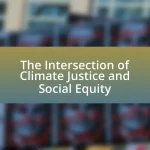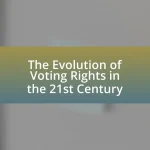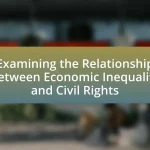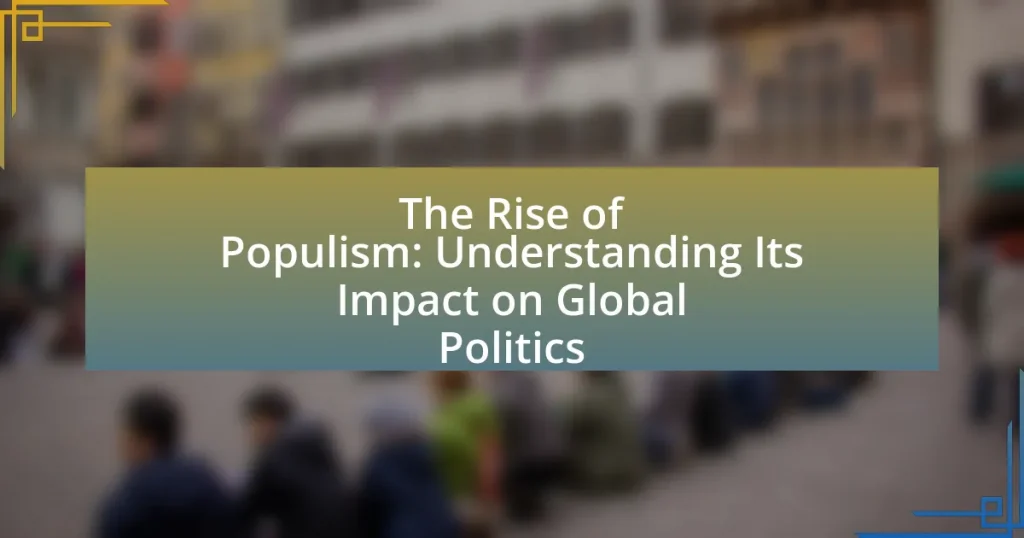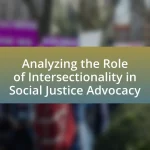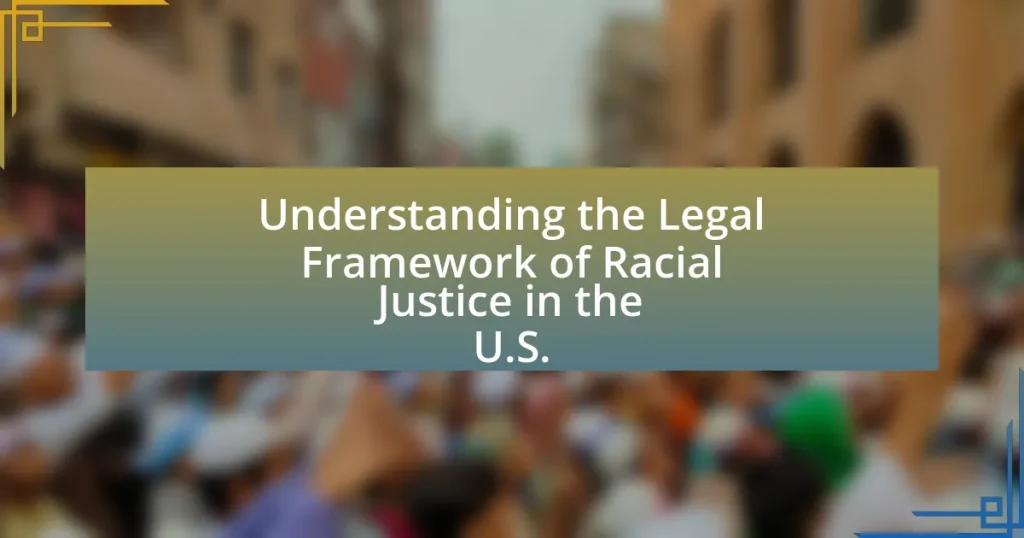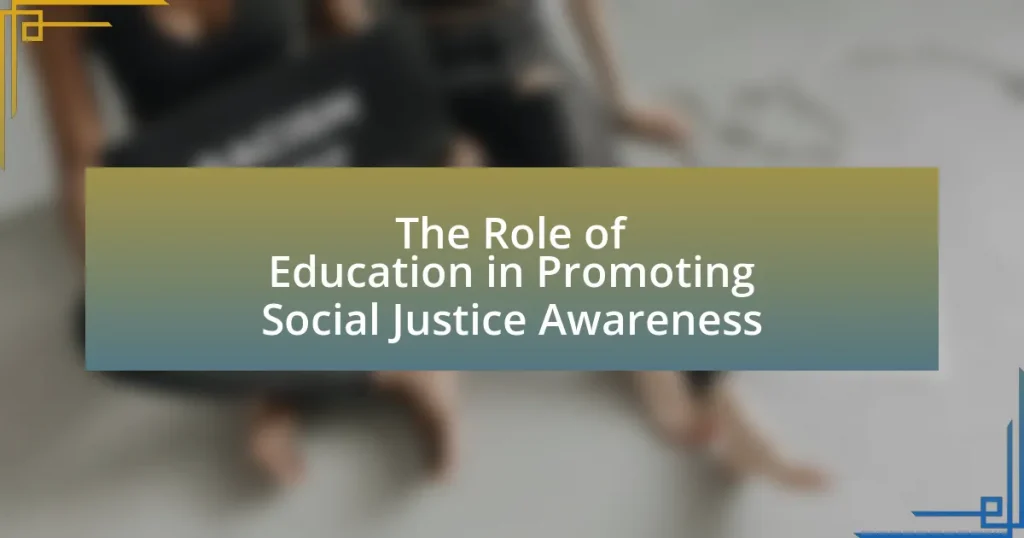Populism is a political approach that seeks to represent the interests of ordinary people against a perceived elite, gaining traction due to factors such as economic inequality, political disenfranchisement, and cultural backlash against globalization. The article explores the definition of populism, its key characteristics, and the global factors contributing to its rise, including economic changes and the role of social media. It examines how populism differs from traditional political ideologies, its impact on political polarization, governance, and international relations, as well as the social implications for minority rights and social cohesion. Additionally, the article discusses strategies for addressing the challenges posed by populism and the role of civil society in countering populist narratives.
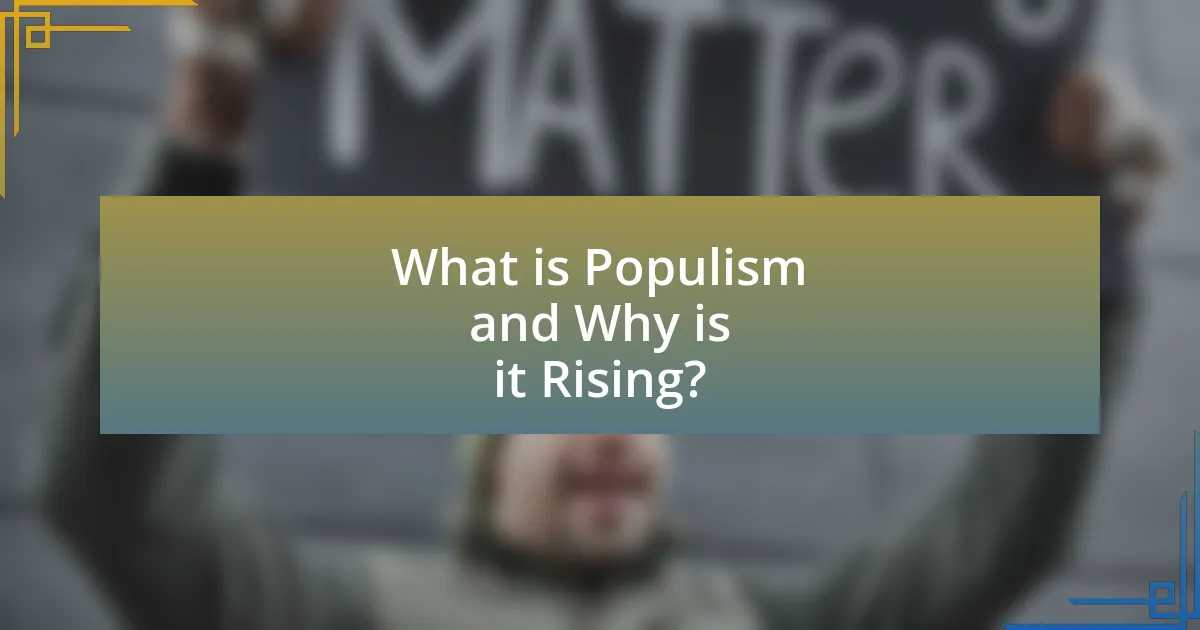
What is Populism and Why is it Rising?
Populism is a political approach that seeks to represent the interests of ordinary people, often contrasting them against a perceived elite or establishment. Its rise can be attributed to various factors, including economic inequality, political disenfranchisement, and cultural backlash against globalization. For instance, the 2008 financial crisis exacerbated economic disparities, leading to increased support for populist leaders who promise to address the grievances of the working class. Additionally, the rise of social media has facilitated the spread of populist messages, allowing leaders to connect directly with their supporters while bypassing traditional media channels.
How do we define populism in a political context?
Populism in a political context is defined as a political approach that seeks to represent the interests and concerns of the “common people” against the elite or establishment. This definition is supported by the observation that populist movements often emerge during periods of social or economic discontent, where leaders claim to voice the grievances of the masses. Historical examples include the rise of leaders like Hugo Chávez in Venezuela and Donald Trump in the United States, both of whom positioned themselves as champions of the ordinary citizen against perceived corrupt elites.
What are the key characteristics of populist movements?
Populist movements are characterized by their appeal to the common people against the elite, emphasizing a dichotomy between “the people” and “the elite.” These movements often utilize charismatic leadership, mobilizing emotions and grievances to galvanize support. Additionally, populist movements typically advocate for direct democracy and often reject established political institutions, claiming they are corrupt or unresponsive to the needs of the populace. Historical examples include the rise of leaders like Hugo Chávez in Venezuela and Donald Trump in the United States, both of whom capitalized on widespread discontent with the political status quo to gain power.
How does populism differ from traditional political ideologies?
Populism differs from traditional political ideologies by prioritizing the interests and concerns of the “common people” over established elites and institutions. Traditional political ideologies, such as liberalism, conservatism, and socialism, often focus on structured frameworks of governance, economic theories, and social hierarchies. In contrast, populism is characterized by its anti-establishment sentiment, often framing politics as a struggle between the virtuous populace and a corrupt elite. This distinction is evident in the rise of populist leaders who leverage direct communication methods, such as social media, to mobilize support and bypass traditional political channels, as seen in the campaigns of figures like Donald Trump and Jair Bolsonaro.
What factors have contributed to the rise of populism globally?
The rise of populism globally has been primarily driven by economic inequality, political disillusionment, and cultural backlash. Economic inequality has led to a growing divide between the wealthy and the poor, prompting citizens to seek leaders who promise to address their grievances. Political disillusionment stems from a perceived failure of traditional political parties to represent the interests of the average citizen, resulting in a demand for alternative voices. Cultural backlash is often fueled by rapid social changes, including immigration and globalization, which some groups perceive as threats to their identity and values. These factors have collectively created an environment where populist movements can thrive, as evidenced by the electoral successes of populist leaders in various countries, such as Donald Trump in the United States and Jair Bolsonaro in Brazil.
How have economic changes influenced populist sentiments?
Economic changes have significantly influenced populist sentiments by creating feelings of disenfranchisement among the populace. Economic downturns, such as the 2008 financial crisis, led to increased unemployment and income inequality, which fueled public frustration with traditional political elites. This frustration often manifests in support for populist leaders who promise to address the grievances of the “common people” against perceived corrupt establishments. For instance, in the aftermath of the financial crisis, countries like Greece and the United States saw a rise in populist movements, with parties like Syriza and figures like Donald Trump gaining traction by capitalizing on economic discontent.
What role does social media play in the spread of populism?
Social media significantly facilitates the spread of populism by providing a platform for direct communication between populist leaders and their supporters. This medium allows populist figures to bypass traditional media gatekeepers, enabling them to disseminate their messages rapidly and widely. For instance, during the 2016 U.S. presidential election, Donald Trump utilized Twitter to communicate directly with millions of followers, shaping public discourse and rallying support without relying on conventional news outlets. Research indicates that social media can amplify populist sentiments by fostering echo chambers, where users are exposed primarily to information that reinforces their existing beliefs, thus increasing polarization and support for populist ideologies.
Why is understanding populism important for global politics?
Understanding populism is important for global politics because it shapes political discourse and influences voter behavior across nations. Populism often arises in response to perceived failures of traditional political elites, leading to significant shifts in policy and governance. For instance, the rise of populist leaders like Donald Trump in the United States and Jair Bolsonaro in Brazil has resulted in changes to immigration policies and international relations, reflecting a broader trend of nationalism. Additionally, populism can destabilize established political systems, as seen in the Brexit referendum, where populist sentiments contributed to the United Kingdom’s decision to leave the European Union. Recognizing these dynamics is crucial for policymakers and analysts to navigate the complexities of contemporary political landscapes effectively.
How does populism challenge established political norms?
Populism challenges established political norms by promoting a dichotomy between the “elite” and the “common people,” which undermines traditional political institutions and practices. This movement often rejects established political parties and processes, advocating for direct representation and decision-making that bypasses conventional governance structures. For instance, leaders like Donald Trump in the United States and Jair Bolsonaro in Brazil have utilized populist rhetoric to mobilize support against perceived political elites, leading to significant shifts in policy and governance. The rise of populism has been linked to increased polarization and a decline in trust towards traditional political institutions, as evidenced by surveys indicating that many voters feel disconnected from established political entities.
What implications does populism have for democracy?
Populism can undermine democracy by eroding institutional checks and balances. Populist leaders often concentrate power, bypassing traditional democratic processes and diminishing the role of political institutions. For instance, in Hungary, Prime Minister Viktor Orbán has implemented measures that weaken judicial independence and media freedom, which are essential for a functioning democracy. This trend can lead to the marginalization of dissenting voices and the entrenchment of authoritarian practices, ultimately threatening democratic norms and values.
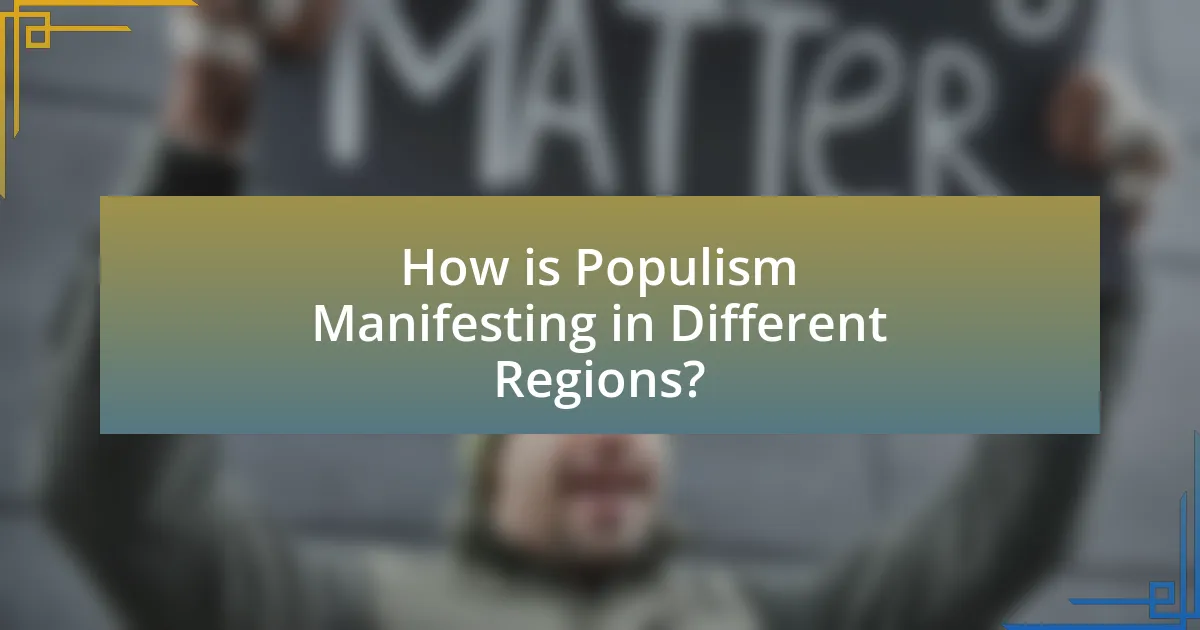
How is Populism Manifesting in Different Regions?
Populism is manifesting in different regions through various political movements that emphasize anti-establishment sentiments and appeal to the common people. In Europe, for instance, parties like Italy’s League and France’s National Rally have gained traction by opposing immigration and the European Union, reflecting widespread discontent with traditional political elites. In Latin America, leaders such as Jair Bolsonaro in Brazil and Andrés Manuel López Obrador in Mexico have utilized populist rhetoric to address economic inequality and corruption, often positioning themselves as champions of the marginalized. In the United States, the rise of Donald Trump showcased populism through a focus on nationalism and criticism of globalism, resonating with voters feeling left behind by globalization. These manifestations are supported by rising economic disparities and a growing distrust in established political institutions across these regions.
What are some notable examples of populist leaders around the world?
Notable examples of populist leaders around the world include Donald Trump in the United States, Jair Bolsonaro in Brazil, and Viktor Orbán in Hungary. Donald Trump, who served as President from 2017 to 2021, utilized anti-establishment rhetoric and focused on nationalism, appealing to a significant portion of the American electorate. Jair Bolsonaro, elected in 2018, gained support through his promises to combat corruption and crime, often using controversial statements to connect with voters. Viktor Orbán, Prime Minister since 2010, has implemented policies emphasizing national sovereignty and anti-immigration stances, which resonate with his base. These leaders exemplify the populist trend by prioritizing the voice of the “common people” against perceived elites.
How have these leaders shaped their respective countries’ policies?
Populist leaders have significantly shaped their respective countries’ policies by prioritizing nationalist agendas and appealing directly to the public’s sentiments. For instance, leaders like Donald Trump in the United States implemented protectionist trade policies, such as tariffs on imports from China, aiming to revive domestic manufacturing and reduce trade deficits. Similarly, Jair Bolsonaro in Brazil has pursued policies that emphasize deregulation and agribusiness expansion, reflecting a populist approach that resonates with rural voters. These leaders often utilize direct communication channels, such as social media, to bypass traditional media and engage with their supporters, further solidifying their influence on national policy.
What common themes can be identified among these populist movements?
Common themes identified among populist movements include anti-establishment sentiment, nationalism, and a focus on direct democracy. Anti-establishment sentiment manifests as a rejection of traditional political elites, often portraying them as corrupt or out of touch with the common people. Nationalism emphasizes the importance of national identity and sovereignty, frequently advocating for policies that prioritize native citizens over immigrants. Additionally, a focus on direct democracy is evident, as populist leaders often call for referendums or other forms of direct public engagement to legitimize their agendas. These themes are consistently observed in various populist movements worldwide, such as the Brexit campaign in the United Kingdom and the rise of leaders like Donald Trump in the United States, both of which leveraged these sentiments to mobilize support.
How does populism affect political polarization in various regions?
Populism increases political polarization in various regions by creating a dichotomy between the “elite” and the “common people.” This division often leads to heightened tensions and animosity between opposing political factions. For instance, in the United States, the rise of populist leaders has been linked to increased partisan divides, as evidenced by the 2016 presidential election, where voter alignment became more polarized along ideological lines. Similarly, in Europe, populist movements have contributed to the fragmentation of traditional party systems, as seen in countries like Italy and Hungary, where populist parties have gained significant support by appealing to nationalist sentiments and anti-establishment rhetoric. These trends illustrate how populism not only amplifies existing divisions but also fosters an environment where compromise becomes increasingly difficult, thereby entrenching political polarization across different regions.
What are the consequences of increased polarization on governance?
Increased polarization negatively impacts governance by leading to legislative gridlock and undermining democratic processes. When political factions become highly divided, cooperation between parties diminishes, resulting in an inability to pass essential legislation. For instance, the U.S. Congress has experienced numerous instances of stalemate, particularly during budget negotiations, where partisan divides have prevented the passage of critical funding bills. Additionally, heightened polarization can erode public trust in institutions, as citizens may perceive their government as ineffective or biased, further complicating governance. Research from the Pew Research Center indicates that political polarization has increased significantly over the past two decades, correlating with a decline in bipartisan cooperation and an increase in public disillusionment with political institutions.
How do populist movements interact with mainstream political parties?
Populist movements often challenge mainstream political parties by positioning themselves as representatives of the “common people” against a perceived corrupt elite. This interaction can manifest in various ways, including competition for voter support, influencing party platforms, and sometimes leading to the co-optation of populist ideas by mainstream parties. For instance, the rise of populist parties in Europe, such as the National Rally in France, has forced traditional parties to adopt more nationalist and anti-immigration stances to retain their voter base. Additionally, populist movements can disrupt established political norms, as seen in the United States with the emergence of figures like Donald Trump, who reshaped the Republican Party’s identity and priorities. This dynamic illustrates how populist movements can significantly impact the strategies and policies of mainstream political parties.
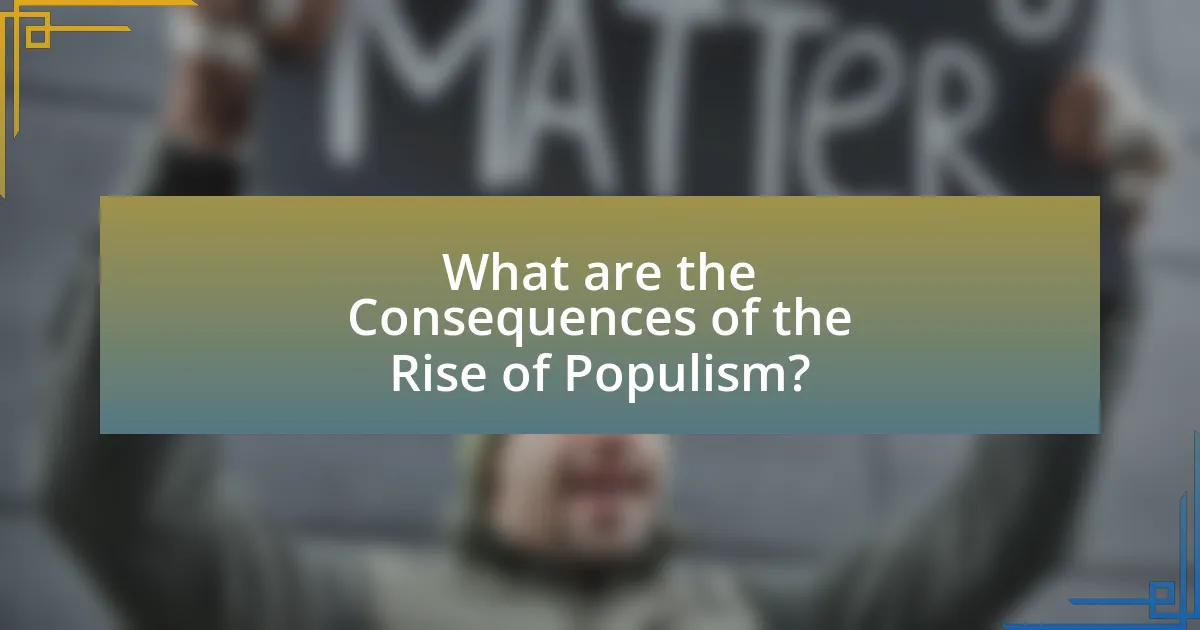
What are the Consequences of the Rise of Populism?
The rise of populism leads to significant political polarization and the erosion of democratic norms. Populist movements often capitalize on public discontent, resulting in increased division between political factions and undermining traditional party systems. For instance, the election of populist leaders in various countries has been associated with a decline in trust towards institutions, as seen in Hungary and Brazil, where populist governments have challenged judicial independence and media freedom. Additionally, populism can provoke social unrest, as seen in France during the Yellow Vest protests, where economic grievances were amplified by populist rhetoric. These consequences highlight the transformative and often destabilizing effects of populism on global politics.
How does populism impact international relations?
Populism impacts international relations by fostering nationalism and undermining multilateral cooperation. Nationalist leaders often prioritize domestic interests over global collaboration, leading to strained diplomatic ties and reduced participation in international agreements. For instance, the rise of populist leaders like Donald Trump in the United States resulted in the withdrawal from the Paris Agreement, which weakened global climate initiatives. Additionally, populist rhetoric can create divisions between countries, as seen in the Brexit campaign, where anti-immigration sentiments influenced the UK’s decision to leave the European Union, disrupting established alliances and trade relationships.
What changes in foreign policy can be observed in populist regimes?
Populist regimes often exhibit a shift towards nationalism in their foreign policy, prioritizing domestic interests over international cooperation. This change is characterized by a reduction in multilateral engagements, as seen in the withdrawal of the United States from the Paris Agreement under President Trump, which reflected a populist agenda focused on “America First.” Additionally, populist leaders frequently adopt a confrontational stance towards traditional allies and international institutions, as evidenced by the strained relations between Hungary’s Viktor Orbán and the European Union. These regimes also tend to emphasize bilateral agreements that favor their national interests, often at the expense of established global norms and alliances.
How does populism influence global cooperation on issues like climate change?
Populism negatively influences global cooperation on climate change by prioritizing national interests over collective action. Populist leaders often adopt anti-globalization rhetoric, which undermines international agreements like the Paris Accord. For instance, the withdrawal of the United States from the Paris Agreement in 2017 under a populist administration exemplifies how populist policies can disrupt collaborative efforts to combat climate change. This trend can lead to fragmented responses to environmental challenges, as countries may focus on short-term domestic concerns rather than long-term global solutions.
What are the social implications of rising populism?
Rising populism leads to increased polarization within societies, often resulting in social fragmentation and conflict. This phenomenon is evidenced by the growing divide between populist supporters and opponents, which can manifest in heightened tensions, protests, and even violence, as seen in various countries where populist leaders have gained power. For instance, the election of populist leaders in the United States and Brazil has been accompanied by significant social unrest and division, highlighting how populism can disrupt social cohesion and foster an environment of distrust among different societal groups.
How does populism affect social cohesion within societies?
Populism negatively affects social cohesion within societies by fostering division and polarization among different social groups. This political approach often emphasizes an “us versus them” mentality, which can lead to increased tensions between various segments of the population, such as economic classes, ethnic groups, or political affiliations. For instance, research by Cas Mudde and Cristóbal Rovira Kaltwasser in their book “Populism: A Very Short Introduction” highlights how populist leaders exploit societal grievances, which can exacerbate existing conflicts and undermine trust in institutions. Consequently, the rise of populism can weaken the social fabric by promoting hostility and reducing collaborative efforts among citizens.
What are the potential risks of populism for minority rights?
Populism poses significant risks to minority rights by often prioritizing the will of the majority over the protection of marginalized groups. This majoritarian approach can lead to the erosion of legal protections and social services that safeguard minority interests, as seen in various populist movements worldwide. For instance, in Hungary, the government under Viktor Orbán has implemented policies that undermine the rights of ethnic minorities and refugees, reflecting a trend where populist leaders exploit nationalist sentiments to marginalize these groups. Additionally, populist rhetoric frequently dehumanizes minorities, fostering an environment of intolerance and discrimination, which can result in increased violence and social division, as evidenced by rising hate crimes in countries experiencing populist surges.
What strategies can be employed to address the challenges posed by populism?
To address the challenges posed by populism, governments and political institutions can implement inclusive dialogue, strengthen democratic norms, and enhance economic opportunities. Inclusive dialogue fosters communication between populist leaders and their constituents, allowing for the expression of grievances while promoting understanding. Strengthening democratic norms involves reinforcing the rule of law, protecting minority rights, and ensuring free and fair elections, which can counteract the divisive rhetoric often associated with populism. Enhancing economic opportunities through targeted policies, such as job creation and social safety nets, can mitigate the economic anxieties that populist movements exploit. These strategies are supported by research indicating that addressing underlying social and economic issues can reduce the appeal of populist narratives.
How can political institutions adapt to the rise of populism?
Political institutions can adapt to the rise of populism by increasing responsiveness to public concerns and enhancing transparency in governance. This adaptation involves implementing mechanisms for direct citizen engagement, such as referendums and public consultations, which can help bridge the gap between institutions and the electorate. For instance, countries like Switzerland have successfully utilized direct democracy to address populist sentiments, allowing citizens to have a direct say in policy decisions. Additionally, political institutions can reform their communication strategies to better convey their actions and decisions, thereby countering misinformation and fostering trust. Evidence from various democracies shows that when institutions prioritize accountability and inclusivity, they can mitigate the appeal of populist movements.
What role can civil society play in countering populist narratives?
Civil society can play a crucial role in countering populist narratives by promoting democratic values, fostering critical thinking, and encouraging civic engagement. Organizations within civil society, such as NGOs and community groups, can educate the public about the dangers of populism, which often relies on misinformation and divisive rhetoric. For instance, initiatives that focus on media literacy can help individuals discern credible information from false claims, thereby reducing the effectiveness of populist messaging. Additionally, civil society can mobilize grassroots movements that advocate for inclusive policies and social cohesion, countering the exclusionary tactics often employed by populist leaders. Research indicates that strong civil society engagement correlates with higher levels of political participation and trust in democratic institutions, which are essential in mitigating the appeal of populism.



